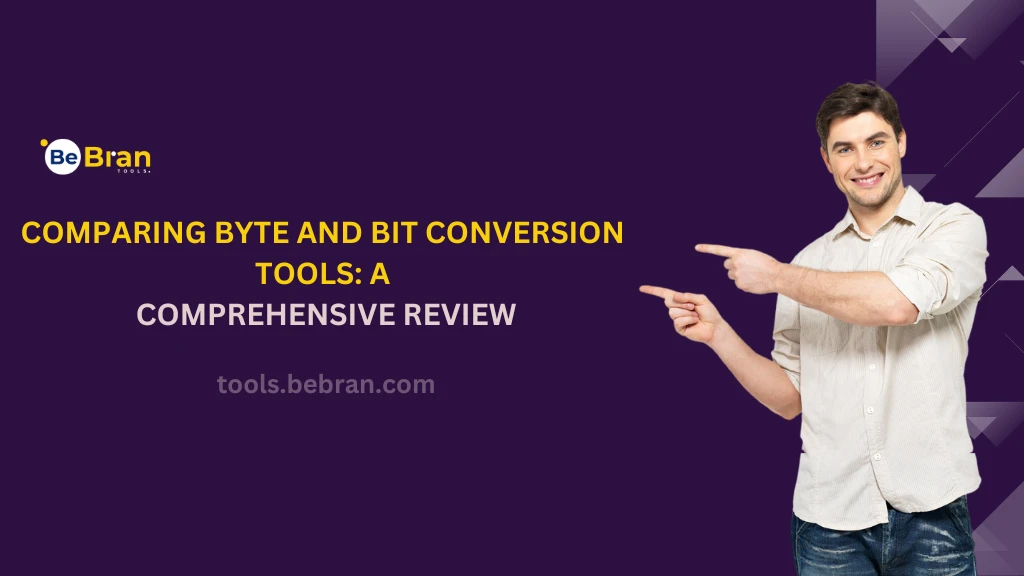
Comparing Byte and Bit Conversion Tools: A Comprehensive Review
When discussing digital data, two fundamental units frequently come into play: bytes and bits. Understanding the distinction between them and having tools to convert one to the other is crucial in various technological contexts. This comprehensive review will compare and contrast different byte and bit conversion tools, examining their features, accuracy, user-friendliness, and overall utility.
Bytes and Bits: Criteria for Comparison
Before diving into the tools, it's essential to understand what bytes and bits are. A bit is the most basic unit of data in computing and digital communications, representing a binary value (either 0 or 1). A byte, on the other hand, is a unit of digital information that most commonly consists of eight bits. This distinction is fundamental because it affects data transfer rates, storage calculations, and more.
The evaluation of conversion tools will be based on the following criteria:
- Accuracy: The primary function of these tools is to provide precise conversions between bytes and bits.
- User Interface (UI) and Experience (UX): A tool should be easy to navigate and intuitive to use, regardless of the user's technical background.
- Features and Flexibility: Some tools offer additional features such as conversions to other units (like kilobytes or gigabits) or integration with other applications.
- Speed and Efficiency: In today's fast-paced world, a tool's ability to perform quick conversions is vital.
- Accessibility and Platform Compatibility: The tool's availability across different platforms (web, mobile, desktop) and its accessibility features.
Check this out: Volume Converter Tools For Travelers Navigating Different Measurement Systems | Choosing The Right Voltage Converter An Online Tool Guide
Review of Popular Conversion Tools
- Simple Online Converters:
Pros: They are usually free and straightforward. Ideal for quick, one-time conversions.
Cons: Lack advanced features and may not be suitable for complex conversion needs. - Desktop Applications:
Pros: Often more robust and feature-rich. Suitable for professionals who need regular conversions.
Cons: May require installation and are not as readily accessible as online tools. - Mobile Apps:
Pros: Provide on-the-go conversion capabilities. Often user-friendly with simple interfaces.
Cons: May lack the advanced features of desktop applications. - Integrated Tools in Operating Systems:
Pros: Offer seamless integration with the system's other functionalities.
Cons: Limited in features and flexibility compared to standalone tools.
Technical Accuracy and Reliability
The accuracy of these tools is paramount. A detailed look into how they handle different units of measurement and their precision can help in evaluating their reliability.
Usability and Interface Design
A tool is only as good as its ease of use. An analysis of the UI/UX designs of these tools will reveal which are more user-centric and which might pose challenges to certain users.
Additional Features and Integration Capabilities
Some tools go beyond basic conversion and offer integration with other software or additional functionalities like batch conversions or historical data logging. These features can significantly enhance a tool's utility.
Speed and Performance
In a high-speed digital environment, the efficiency of a tool can be a crucial factor. This section will evaluate how these tools perform under different conditions and loads.
Free Tools: Free Time Converter Tool Online | Free Torque Converter Tool Online
Accessibility and Cross-Platform Availability
The availability of these tools across various platforms and their accessibility features, like screen reader compatibility or multilingual support, are also important aspects to consider.
Read More: Tips For Optimizing Png Images Before Converting To Pdf | Demystifying Voltage Converters A Comprehensive Guide
Conclusion
In conclusion, while many byte and bit conversion tools are available, each has its strengths and weaknesses. The best choice depends on the user's specific needs, whether they prioritize accuracy, additional features, or simplicity of use. This review aims to provide a comprehensive overview to aid in making an informed decision when selecting a byte and bit conversion tool.
Frequently Asked Questions
1. What is the difference between a byte and a bit?
A bit is the smallest unit of data in computing, represented by a 0 or 1. A byte consists of 8 bits. This distinction is crucial in understanding data size and bandwidth.
2. Why are byte and bit conversion tools important?
These Byte and Bit Conversion Tools are essential for accurately converting data units, which is vital in various computing tasks, such as programming, data storage, and internet speed measurement.
3. Can I convert between bytes and bits manually?
Yes, you can manually convert bytes to bits by multiplying the number of bytes by 8, as there are 8 bits in a byte. However, using a conversion tool ensures accuracy and ease, especially for large numbers.
4. Are byte and bit conversion tools free to use?
Most byte-bit conversion tools available online are free. They provide a quick and easy way to convert data units without any cost.
5. How accurate are these conversion tools?
Generally, these tools are very accurate. They follow the standard conversion rate of 8 bits per byte, ensuring reliable and precise conversions.
6. Do I need to install software to use a byte-bit conversion tool?
No, many byte-bit conversion tools are available online and do not require any software installation. They can be accessed easily through a web browser.
7. Can these tools convert other data units like kilobytes and megabytes?
Yes, many byte-bit conversion tools also handle conversions between larger data units like kilobytes, megabytes, gigabytes, and their bit equivalents.
8. Is an internet connection required to use these tools?
For online conversion tools, an internet connection is required. However, some downloadable tools may work offline.
9. Are these tools suitable for professional use?
Absolutely. Professionals in IT, digital media, and data analysis regularly use these tools for accurate data unit conversions in their work.
10. Do byte-bit conversion tools keep a record of my data?
Most reputable online conversion tools do not store user data. It’s always a good practice to check the privacy policy of the tool you are using.



